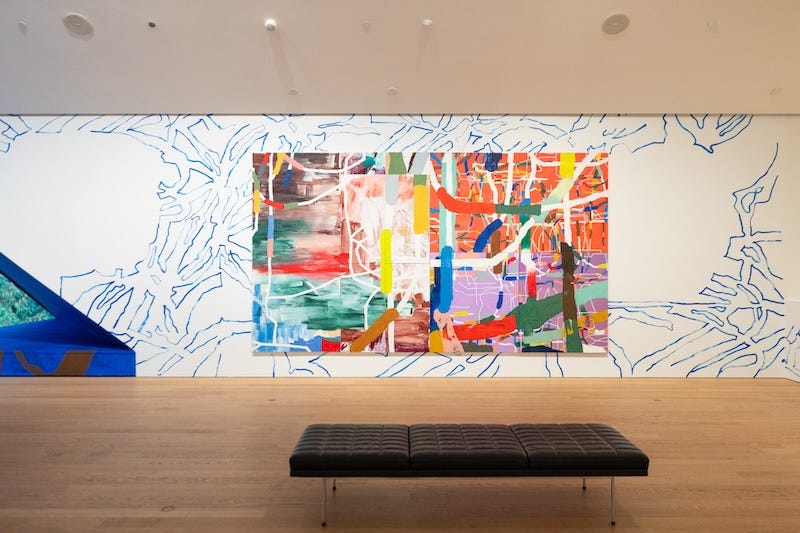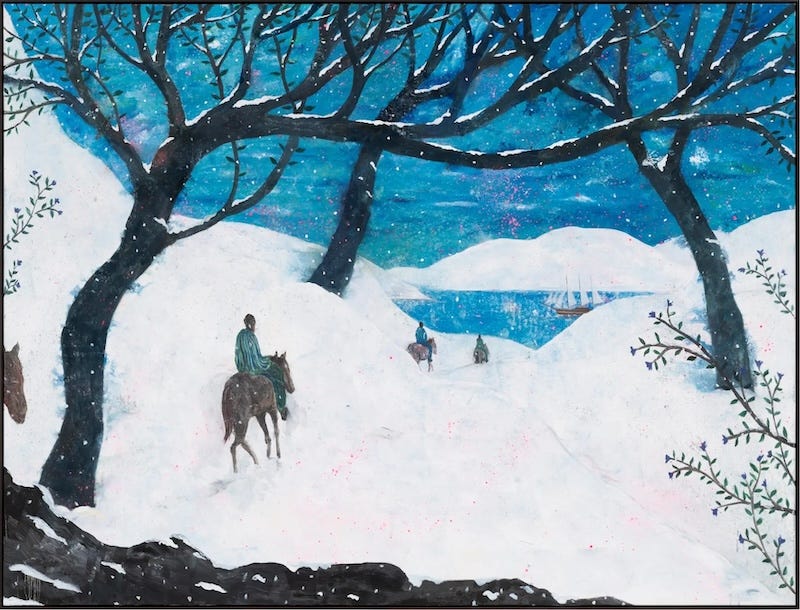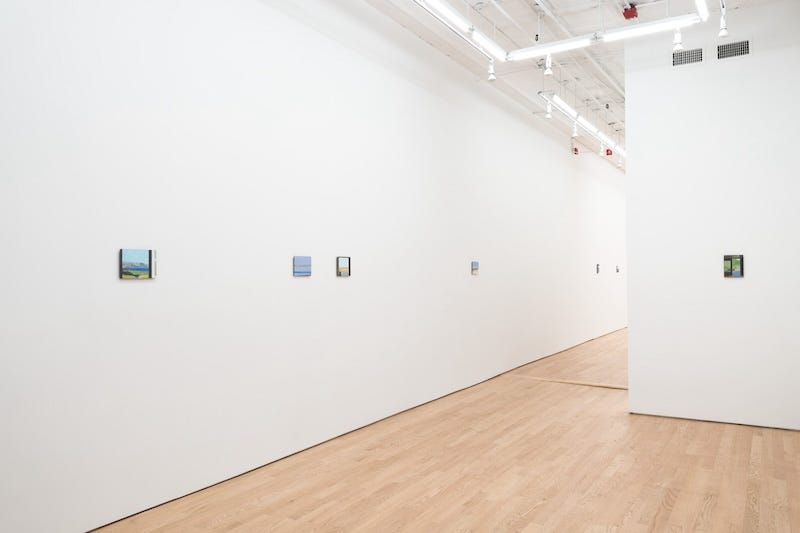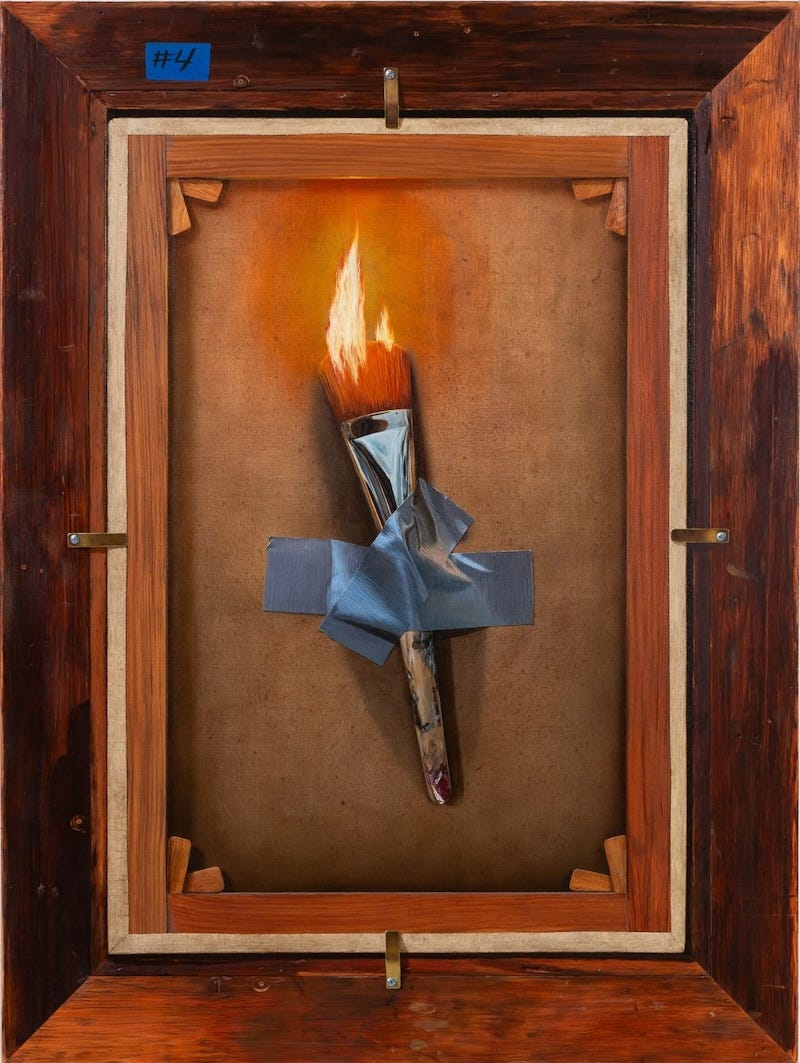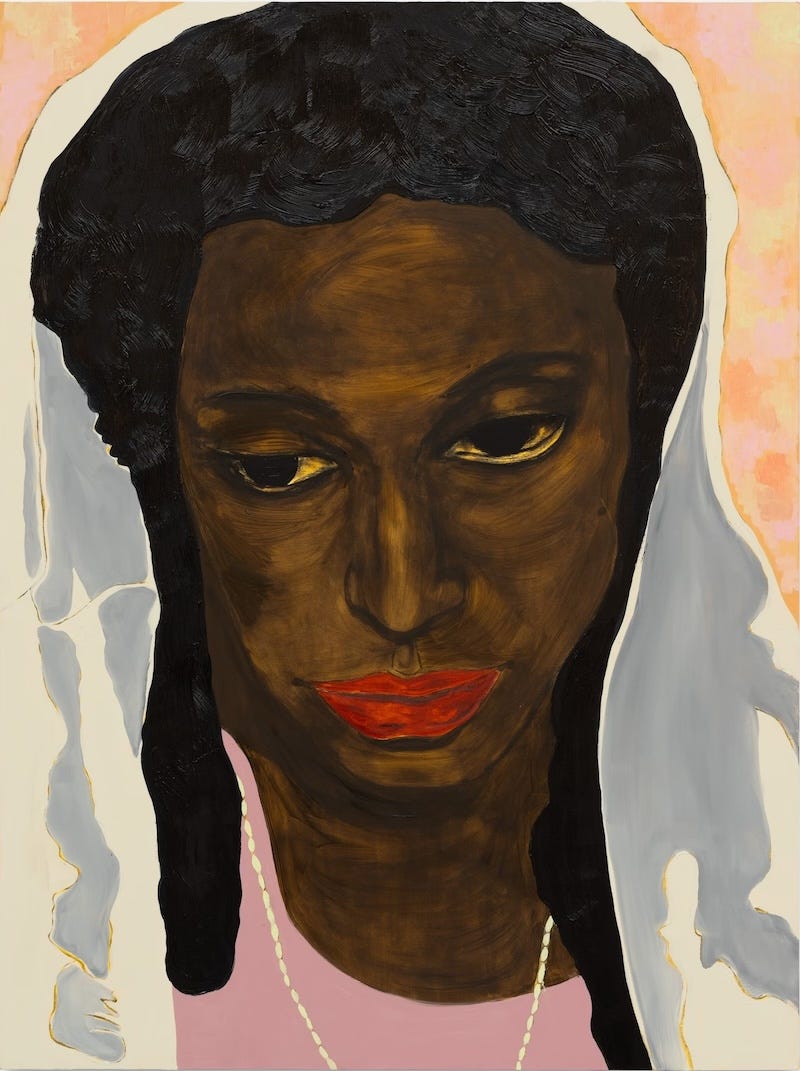
“Whether you succeed or not is irrelevant, there is no such thing. Making your unknown known is the important thing.” —Georgia O’Keeffe
I’m drafting this on Tuesday afternoon, before the results of the U.S. presidential election. A colleague asked me this morning if I planned on doing any renovation work this week in the new annex-in-progress, and I thought, “No big plans unless I feel like I need to break things, which I hope I don’t.”*
Last week, I mentioned that I’ve been diving back into some Black Mountain College research, which I was practically obsessed with during my master’s program and a few years following. Incidentally, I was part of the group that originally founded School of the Alternative, which pops up for a few weeks every summer on the original BMC campus. That project has since taken on a life of its own, but recently it’s been on my mind, too, as I’ve been thinking more and more about residencies and alternative arts education. I’m diving back in.
Partly, there is an astonishing legacy in Black Mountain College, which spurred the careers of formidable 20th-century artists like Ruth Asawa, Robert Rauschenberg, John Cage, and many more. Partly, there is an undeniable kind of utopian, golden-age element to what I think of as a kind of “borrowed nostalgia” for the place. This can be dangerous to dwell in too long, but it can also pull us out of unwanted situations to consider models for how to affect change, even (perhaps especially) on a small scale.
Not without its own trials and tribulations—plenty of interpersonal sparring and occasional weirdness—it’s tempting to look back on this period (the school ran from 1933 to 1957) as a time of reaction, optimism, and experimentalism. Several faculty, like Josef and Anni Albers, emigrated from Germany when the Nazi regime shut down the Bauhaus. BMC provided a new way of continuing many of the progressive and creative ideals of the earlier institution. Albers went on to head up the Design Department at Yale.
There’s a great anecdote about a teacher named John Adams who, an amateur artist, would consult with other artists on the faculty. Robert Rauschenberg was also teaching there at the time, following a stint as a student in the late ‘40s. One night, Adams walked over to where Rauschenberg was living, crossed the unlit porch and knocked on the door.
The artist answered the door and turned on the porch lights. To his horror, John saw that he had walked across a canvas that Rauschenberg had apparently spread out on the porch to dry. “My God, Bob!” he said, “I’m afraid I’ve ruined your painting!” Rauschenberg didn’t bat an eye, just looked at him intently and asked quietly: “Did you have on interesting shoes?”
BMC continues to provide a model and inspiration for art schools and artist residencies today. That’s why I’m so drawn to its approach and idiosyncratic cast of characters—a real-life implementation of John Dewey’s philosophy of education as fundamentally about experience and hands-on, involved learning. It was fundamentally a democracy in which students often had as much say in the admissions process and policies as the faculty. There’s a book coming out soon about the cooperative farm on the campus, too, which some students were able to trade working on in exchange for part of their tuition.
The emphasis at BMC was not, in fact, specifically on art but on creating the environment for learning in which students would leave as whole people, able to problem-solve and join society at large with confidence and empathy. This is something we can always do with more of. And it reminds me how important it is that residencies and funding programs continuing today—like the ones I list each week at the end of this digest—facilitate these important discussions and provide outlets and safe spaces, especially during tumultuous times.
And as an aside, it feels more important than ever to try to take care of ourselves.
See you next week.
—Kate
*Morning update: I definitely do.
Consider becoming a paid subscriber and directly support this newsletter and independent arts writing on Dovetail. You’ll be the first to see new opportunities, with access to the entire list all in one place—updated a few times each week.
What you’ll find below:
Featured artist: Russna Kaur
Four exhibitions to see in Athens, Brussels, London, and New York City
Eleven opportunities for artists with deadlines coming up soon
Featured Artist: Russna Kaur
I first learned about Russna Kaur’s work more than four years ago, when it was included in a virtual presentation in 2020. Her handling of color, like textiles or cartographic terrain across often large-scale canvases, are currently expanded even further in a site-specific installation at the Audain Art Museum.
Kaur, who is based in Vancouver, explores ideas around infinite possibility, play, and experimentation in Pierced into the air, the temper and secrets crept in with a cry!, which continues in Whistler, British Columbia, through January 27.
Photos by Oisin McHugh.
Exhibitions
LONDON | JOSH LILLEY GALLERY
Tom Anholt: Rising Tide
“Anholt comments that the meaning of a given painting may not reveal itself to him until weeks after its completion, his role is simply to present each vision with sincerity, planting a kernel of emotional truth in the hope that it will grow over time.”
Runs through November 16
NEW YORK CITY | NICELLE BEAUCHENE
Eleanor Ray
Ray’s gorgeous landscapes, often viewed through apertures or the outline of porches, are luminous on an intimate scale.
Runs through November 16
ATHENS | DIO HORIA
Katelyn Ledford: Tired Illusions
Tired Illusions presents the culmination of Ledford’s three-week residency at Dio Horia in September, focusing on the artist’s playful trompe-l'œil approach to portraying the process of art-making itself.
Runs through November 18
BRUSSELS | XAVIER HUFKENS
Cassi Namoda: The Equator’s Forfeit
Made between the U.S. and Europe, Namoda’s paintings are informed by her frequent visits to Mozambique, where she was born. She roots her compositions in personal experience while also reflecting broader historical and contemporary truths.
Runs through November 23
Artist Opportunities
Young Space emphasizes fully-funded opportunities with low or no entry fees and programs that focus on creative and professional development for visual artists. Deadlines are coming up soon to apply for these grants, fellowships, residencies, and more.
Paid subscribers, check out the whole list anytime at yngspc.com/opportunities and enter the password you received in your signup email. Can’t find it? Just shoot me a note. Thank your for your support!
Wherewithal Grants for Artists in Washington, D.C.
Deadline: November 12
These $7,500 grants support ongoing or new projects that embrace unconventional or DIY values and will be presented publicly in the D.C. area during the grant period (January to December 2025). Project & Presentation grants are intended to directly support artists presenting work in spaces beyond commercial galleries, museums, or established non-profit art spaces.
Submission fee: none
Skowhegan 2025 Programs
Deadline: November 15
During the nine-week program, artists working across all disciplines have the opportunity to live as a community of peers on Skowhegan’s 350-acre campus in rural Maine. This summer, Skowhegan runs from June 7 to August 9. All artists are welcome to apply. Experimentation, intellectual curiosity, and the ability to collaborate and interact with peers are the main requirements. Some scholarships are available.
Submission fee: $50 if submitted before November 12; $80 from November 13 to 15
Center for Craft — Craft Research Fund Grant
Extended deadline: November 15
The Craft Research Fund is the Center’s first and longest-running grant program dedicated to supporting new and interdisciplinary research about craft in the United States. Grants up to $15,000 are awarded to support new and interdisciplinary research about craft in the United States.
Submission fee: none
Art Hub Copenhagen Residencies
Deadline: November 17
Art Hub Residency is both for recently graduated artists and others, for whom the residency program could make a difference in terms of establishing and expanding their practice nationally and internationally. Age is not a factor. The Art Hub Residency features a studio, a monthly fee, a production budget, and a program of development and feedback based on the needs of each individual artist.
Submission fee: none
The Hale Master of Fine Art Residency in Nantucket
Deadline: November 18
The Hale Master of Fine Art Residency funds artists who either have recently graduated (within 5 years) from or are currently enrolled in an MFA graduate program. This month-long residency is designed for an artist whose work explores aesthetic beauty. There is no expectation to teach, exhibit, or present work. Hale Residencies take place only during the months of January, February, and March. Artists chosen receive $500 toward travel and a $2,000 stipend for materials and living expenses.
Submission fee: none
Asian Cultural Council 2025 Asia Grant Cycle
Deadline: November 18
ACC grants provide long-term, immersive exploration of other cultures. The organization seeks artists, arts and culture professionals, and organizations who demonstrate a commitment to advancing cultural exchange as part of their ongoing artistic and professional growth. ACC has developed four distinct fellowship and grant types to support immersive cultural exchange:
New York Fellowship
Individual Fellowship
Graduate Fellowship
Organization Grant
The 2025 grant cycle is open to applicants who are citizens or legal permanent residents of China (Mainland), Hong Kong SAR, Japan, Macau SAR, the Philippines, and Taiwan ROC.
Submission fee: none
Craft Futures Fund - WNC Emergency Relief Mini Grants
Rolling applications through November 17
Craft Futures Fund - WNC Emergency Relief takes the form of one-time, unrestricted $500 grants to a broad range of craft-based artists, makers, creative manufacturers, and culture bearers in Western North Carolina who have been impacted by Hurricane Helene. Grants are reviewed and distributed weekly.
Submission fee: none
2025 New Mexico Arts Artist Residency at Los Luceros Historic Site
Deadline: November 21
Each of the two residencies will take place over a six-week period in which the artist resides and works in Alcalde, New Mexico. Artists will have access to and are encouraged to interact with the land, culture, and the extensive local historic archival materials at the sites, visitor center, and surrounding area. Public engagement opportunities include, but are not limited to: an artist talk or exhibition, workshop, temporary site-specific installations, performances, etc. Lodging for the artists will be provided by the Los Luceros Historic Site at the River House, and the all-inclusive stipend is $14,000.
Submission fee: none
ACRE Summer 2025 Residencies
Deadline: November 26
ACRE’s summer residency program takes place each summer in rural Southwest Wisconsin. Run by a large community of volunteers, the program is designed to help fellow emerging artists develop, present, and grow their creative practices. Most residents stay in the sprawling Steuben Lodge, which houses around 40 people and contains a large central area that includes a library with limited wireless internet, breakfast area, computers, printers and scanners for everyone’s use. The fee for a 14-day residency is $700. Some scholarships are available.
Submission fee: none
Pallas Projects: Artist-Initiated Projects at PP/S
Deadline: November 26
Pallas Projects/Studios is one of Ireland's longest running artist-run spaces, providing opportunities for emerging and mid-career artists to develop and exhibit new work. Artist-Initiated Projects is an Arts Council funded, open-submission, annual gallery program that is highly accessible to artists, presented in the context of an established gallery space with a dedicated tradition towards the development of artists in a peer-led, supportive environment. The selected artist receives a fee/production budget of €1,000 for solo, and €2,000 for group exhibitions, plus all associated gallery costs paid.
Submission fee: none
Yale School of Art Committee for Art Recognizing Enslavement (CARE) Project Grants
Deadline: November 30
Yale’s Committee for Art Recognizing Enslavement (CARE) is seeking artists with experience in public art, socially engaged art, or participatory art to create artistic interventions, permanent and ephemeral, and related programming in New Haven to address Yale’s historical roles and associations with slavery and the slave trade as well as the legacy of that history. Inclusive programming that fosters reflection, remembrance, discussion, learning, and healing will be essential for each project. The Committee encourages artists to consider the monumental nature of this work and the projected timeline as part of their process in determining interest. CARE will consider temporary or permanent works, and will award multiple project grants ranging from $100,000-$500,000 in the next 3-5 years.
Submission fee: none
See all opportunities
Paid subscribers can access a full list of all current opportunities anytime—updated at least a couple of times each week.
Whether you’re a free or paid subscriber, you can also browse through listings in earlier digests in the archive.
If you are part of an organization or art business that offers opportunities or services you think artists should know about, consider a featured listing or post. Email me at kate@young-space.com or just reply to this email for more info.
Visit on the Young Space Instagram.
Read more on Dovetail.




